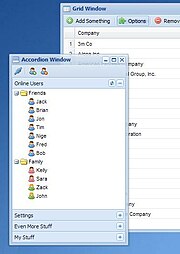Ext JS: Difference between revisions
Updated latest version to 2.21 |
|||
| Line 5: | Line 5: | ||
| name = Ext JavaScript Library |
| name = Ext JavaScript Library |
||
| developer = Jack Slocum, Brian Moeskau, Aaron Conran, Rich Waters |
| developer = Jack Slocum, Brian Moeskau, Aaron Conran, Rich Waters |
||
| latest_release_version = [http://extjs.com/deploy/ |
| latest_release_version = [http://www.extjs.com/deploy/dev/CHANGES.html 2.21] |
||
| latest_release_date = [http://extjs.com/deploy/ |
| latest_release_date = [http://www.extjs.com/deploy/dev/CHANGES.html February 1, 2009] |
||
| genre = [[JavaScript library]] |
| genre = [[JavaScript library]] |
||
| license = [[GPL]]v3, commercial |
| license = [[GPL]]v3, commercial |
||
Revision as of 19:56, 7 April 2009
 ExtJS 2.0 Web Desktop | |
| Developer(s) | Jack Slocum, Brian Moeskau, Aaron Conran, Rich Waters |
|---|---|
| Stable release | |
| Type | JavaScript library |
| License | GPLv3, commercial |
| Website | extjs.com |
Ext (pronounced "X'd"[1]) is a JavaScript library for building interactive web applications[2] using techniques such as AJAX, DHTML and DOM scripting.
Originally built as an add-on library extension of YUI, Ext includes interoperability with jQuery and Prototype. As of version 1.1, Ext retains no dependencies on external libraries, instead making their use optional. [3]
Features
GUI controls
Ext includes a diverse set of GUI-based form controls (or "widgets") for use within web applications, these include:
- text field and textarea input controls
- date fields with a pop-up date-picker
- numeric fields
- list box and comboboxes
- radio and checkbox controls
- html editor control
- grid control (with both read-only and edit modes, sortable data, lockable and draggable columns, and a variety of other features)
- tree control
- tab panels
- toolbars
- desktop-application-style menus
- region panels to allow a form to be divided into multiple sub-sections
- sliders
Many of these controls are able to communicate with a web server using AJAX.
Application support
Ext includes web application support with features such as:
- modal dialog boxes
- interactive user-input validation prompts
- state management
Other features include a DOM selector class allowing operations to be performed on elements within the page, data stores that can be used to manage data, and classes to create and manage data in JSON and XML formats.
Ext 2.0
Ext version 2.0 was released on 4 December 2007. This version was promoted as providing an interface and features more similar to those traditionally associated with desktop applications. Also promoted were the new user documentation, API documentation, and samples [4].
Ext 2.0 doesn't provide backward compatibility with version 1.1. A migration guide was developed to address this.
License History
The open source license associated with Ext has been subject to change and critique from commentators. In version 2.0.2, the authors claimed Ext was available under an LGPL license as long as you "plan to use Ext in a personal, educational or non-profit manner" or "in an open source project that precludes using non-open source software" or "are using Ext in a commercial application that is not a software development library or toolkit". This was no longer the case with ExtJS 2.1[5]. Some people claimed that the license conditions as the authors described it stood whilst others would claim that the LGPL license clause 7[6] enabled the software to be used by all to use regardless of Ext's conditions. The Ext authors claim that section 7 of the LGPL as it is worded does not apply to "conditions" which their license requires before distribution under the LGPL is permitted as opposed to "additional restrictions" which section 7 allows a distributor to remove.[citation needed] There was some controversy when the creators of Ext JS suddenly decided to switch the license from LGPL to GPL.
On April 20, 2008 Ext 2.1 was released under a new dual license which allowed the options of the full GPL 3.0 license or a commercial license.
References
- ^ Pronunciation thread on Ext forum
- ^ (see also, Rich Internet application
- ^ Ext as of version 2.0 can works with different base libraries or adapters. (e.g. YUI, jQuery, Prototype), or it can work standalone.
- ^ API documentation includes a migration guide. http://extjs.com/deploy/dev/docs/
- ^ ExtJS forum thread on the license change
- ^ http://www.gnu.org/licenses/lgpl-3.0.txt
